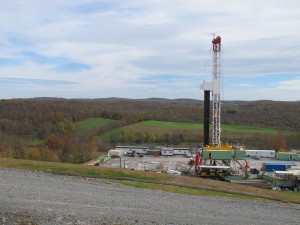Drilling water wells a tactic to block fracking
-
Katie Colaneri
Some landowners who want to block fracking on their property are fighting drilling with drilling.
The Pittsburgh Post-Gazette reports the “water well gambit,” drilling private water wells on sites slated for natural gas drilling, has been used for years, often by people and companies that don’t own the mineral rights to their properties. Mineral rights and surface rights are sold separately under Pennsylvania state law.
The Post-Gazette tells the story of a Pittsburgh-based oil and gas company, the Baron Group, that was temporarily blocked by a surface owner in Westmoreland County using this tactic. Before natural gas drilling could begin, the landowner set up a trailer and had a water well drilled on the site, according to the Post-Gazette:
With less than 200 feet between the water well and the proposed gas well, the landowner thought the gas company would be prohibited from drilling.
“What struck me in that case is that the surface owner readily admitted that they drilled the well for the sole purpose of defeating the oil and gas well and their argument was it did not matter what their motives were, the statute said what the statute said,” said Steve Silverman, an attorney with Babst Calland who represented the Baron Group before the state Environmental Hearing Board.
Perhaps more striking was that the landowner in that case was Tenaska, a Nebraska-based energy company that drills for oil and gas and had plans for a natural gas-fired power plant in South Huntingdon.
The Environmental Hearing Board judge didn’t address the issue of motive. Instead, because the Baron Group drilled its oil and gas well before Tenaska had a chance to connect its water well to the trailer, the Baron Group got the legal advantage. Tenaska was ordered to plug its water well.
The Post-Gazette reports it was the first time such a case appeared before a judge in Pennsylvania, but more of these cases could be heading to court in the Marcellus Shale region.
About six months ago, Steve Townsend, a Pittsburgh-based landowners’ attorney, began to notice a new clause in leases proposed to his clients. It was a promise that the landowner wouldn’t build anything within 200 feet of what’s already on the property.
“Anytime that something is bad for the industry, they just remedy it by putting it into the lease,” Mr. Townsend said.

















